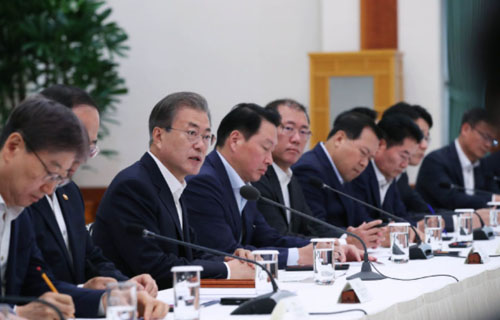FPI / August 15, 2019
As the trade-culture conflict between Seoul and Tokyo heats up, South Korea’s president has floated the controversial idea of a partnership with North Korea.
The move by left-leaning President Moon Jae-In amid a sinking economy was cheered by the South’s official media but enraged the nation’s conservatives.

The South Korea-Japan dispute is also being closely monitored by not only the Kim Jong-Un regime in the North, but by other anti-U.S. powers led by supreme leader Xi Jinping in China and President Vladimir Putin in Russia, reports say.
“If the South and North could create a peace economy through economic cooperation, we can catch up with Japan’s superiority in one burst,” Moon told reporters in Seoul. “Japan absolutely cannot prevent our economy from taking a leap. Rather, [Japan] will serve as a stimulant that strengthens our determination to become an economic power.”
[North Korea’s propaganda outlet, the Korean Central News Agency (KCNA), on Aug. 15 added fuel to the fire by saying Japan has evaded responsibility for its use of Korean forced laborers during the 1910-45 Japanese occupation. The KCNA piece came as the two Koreas were commemorating the 74th anniversary of National Liberation Day, ending Japanese occupation.“We cannot but emphasize the Japanese imperialists dragged about 8,400,000 Korean young and middle-aged people to the sites of the war for overseas aggression and hard-work sites in order to invade the continent, compelled 200,000 Korean women to suffer the miserable fate as sexual slaves for the Imperial Japanese Army and mercilessly killed more than one million people,” read the statement by a spokesperson for the Association of Korean Victims of Forcible Drafting and Their Bereaved Families, based in Pyongyang. The Korea Times noted that the number of the victims referenced by KCNA remains controversial.]
A fight that “melds economic rivalry, cultural tensions and a tangled and fraught history is unlikely to be resolved soon,” Maggie Garred noted in an Aug. 11 analysis for The Washington Times.
Meanwhile, the Trump administration “hopes to project a united front on issues such as containing Pyongyang’s nuclear programs and Beijing’s expanding military and economic clout in the region,” Garred wrote.
Bruce Klingner, a senior research fellow at The Heritage Foundation, said that “At a time when there are strains between our two allies, I think it’s easier for [North Korea] to sort of politically exploit that and try to peel away the two allies from each other and even try to peel away the U.S. from either of them.”
A report by Klingner and fellow Heritage Foundation Asia analyst Riley Walters says the stakes are rising for Washington as the dispute drags on.
The deteriorating situation, they say, puts U.S. strategic objectives at risk: “Japan and South Korea are important economic partners, fellow democracies, and critically important allies against common security threats. Both countries are the foundation of U.S. foreign policy in Asia.”
U.S. Defense Secretary Mark Esper made it clear on a visit to each of the capitals last week that Washington fears the fight will prove divisive at a delicate time.
“Look,” he told reporters en route to Asia, “we have really big challenges in North Korea in the longer term, bigger one in China.”
More . . . . Current Edition . . . . Subscription Information
Intelligence Brief __________ Replace The Media
